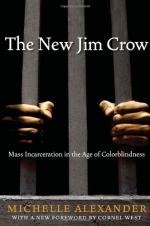
|
| Name: _________________________ | Period: ___________________ |
This quiz consists of 5 multiple choice and 5 short answer questions through Preface and Introduction.
Multiple Choice Questions
1. When did California modify the Three Strikes Law with Proposition 36?
(a) 2012.
(b) 2011.
(c) 2013.
(d) 2015.
2. In the Introduction, the author attests that how many people in Germany are in prison for every 100,000 adults and children?
(a) 116.
(b) 19.
(c) 93.
(d) 215.
3. During the time she worked at the ACLU, Michelle Alexander's focus shifted from employment discrimination to what focus?
(a) Affirmative action.
(b) Criminal justice reform.
(c) Tax reform.
(d) Education reform.
4. What group of people is the focus of The New Jim Crow, according to the author in her Introduction?
(a) African American men.
(b) White American men.
(c) African American women.
(d) Latinos and other immigrants.
5. Where did crack cocaine first emerge in poor black neighborhoods in the United States before spreading elsewhere?
(a) Los Angeles.
(b) Chicago.
(c) New York.
(d) Tuscon.
Short Answer Questions
1. When did the CIA admit that guerilla armies it actively supported in Nicaragua were smuggling crack cocaine into the United States?
2. In the Urban League's 1990 report, "The State of Black America," it stated, "There is at least one concept that must be recognized if one is to see the pervasive and insidious nature of the drug problem for the African American community. Though difficult to accept, that is the concept of" what?
3. Who was the executive director of the Sentencing Project when the book was written?
4. When did Ronald Reagan officially announce the War on Drugs?
5. According to the author in the Introduction, how many people are in prison in the United States per 100,000?
|
This section contains 238 words (approx. 1 page at 300 words per page) |

|




